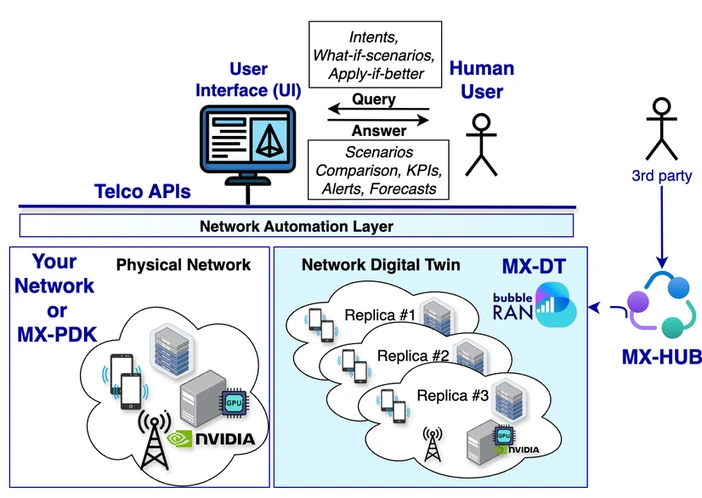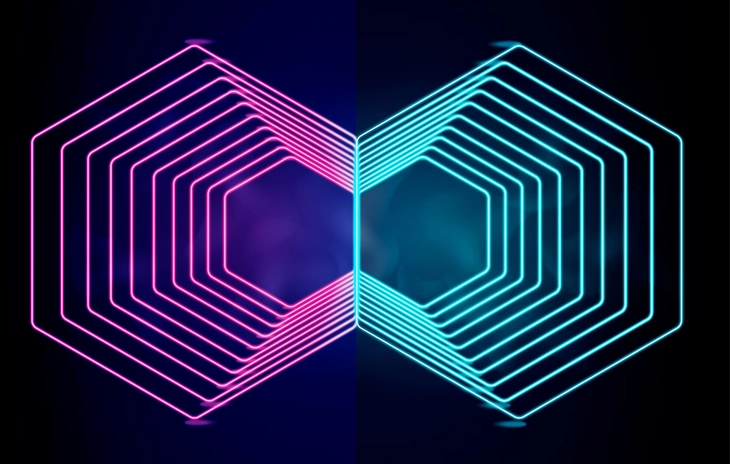🏷️ €19900 | Base Price
MX-DT License including 1 year of updates and support 🔹
+€4400 for 1 additional year of updates and support 🔹
+€9900 for 3 additional year of updates and support 🔹
Contact us Contact us for academic pricing or tailored packages.









MX-DT is a network digital twin platform that delivers a high-fidelity network sandbox for 5G/6G systems. It mirrors production networks at scale with emulated UE in-the-loop, and collects, enhances, and pipelines its data for validation, AI-driven analysis, and scenario testing. With support for parallel replicas and synchronized emulation, MX-DT enables rigorous network planning, what-if analysis, and quasi-real-time optimization of production networks.
💡 Getting started is simple:
- Choose or customize a network blueprint from our portfolio, and deploy it with a single command at scale:
bash$ brc install network oran-5g.yaml - Start network monitoring
bash$ brc install perceptor dt-perceptor.yaml - Create DT replicas of the physical network
bash$ brc install replicator dt-replicator.yaml
📄 MX-DT Data Sheet | 💡 MX-DT WalkThrough | ▶️ MX-DT Demo
Why MX-DT ?
- Spawn parallel replicas: mirror RAN and Core with high fiedelity in both emulation and over-the-air.
- Decouple from live changes: run synced or freeze at any point in time.
- Safelytest hypothesis: apply actions and see the results before production.
- Select the scope: clone a region, a slice, or a site to save resources.
- O-RAN: integrate with MX-AI, MX-PDK, SMO/RIC via open Telco APIs; built-in multi-vendor support with no lock-in.
What’s Included?
- DigitalTwin Operator: orchestrates with state Perceptors and Replicators for RAN, vRAN, C-RAN, Core VNFs and transport.
- Check out our Digital Twin Blog for further details.
- Scenario Kit: traffic mirroring, synthetic generators, fault injection, mobility, spectrum toggles.
- SDK / CDK: build custom mappers, generators and analytics pipelines.
- MX-HUB Access: templates, scenarios, dashboards; share models with the community.
- Web GUI & CLI: create, run, compare and export reports.
- Virtual & Physical Twins: deploy via MX-ORS or connect to physical equipment.

Parallel Digital Twin Sandboxing Example

Tiered Packaging
| Tier | What’s inside |
|---|---|
| Base | (1) Parallel & scoped twins, (2) Live-synced & time-locked, (3) Traffic mirroring & scenarios, (4) Reports & dashboards. |
| Pro | Closed-loop automation and optimization powered by O-RAN and MX-AI |
| Custom | 💡 Bespoke models & workflows |
Capabilities at a Glance
| Capability | Description |
|---|---|
| Parallel replicas | Spawn multiple twins, scoped to cells, slices or regions. |
| Live & time-locked | Keep synced with production or freeze at a past state. |
| Scenario & fault kit | Inject traffic, faults, mobility and spectrum changes. |
| Apply-if-better | Compare dashboards; push only improvements to live. |
| Open APIs & MX-HUB | O-RAN-friendly, share models via MX-HUB. |
| Virtual & physical twins | Combine parallel E2E network emulation and over-the-air twins in one deployment. |
Benefits at a Glance
| Benefit | Description |
|---|---|
| O-RAN-friendly & Open | R1/A1, SMO/RIC ready; share & reuse via MX-HUB. |
| Risk-free deployment | Test in a twin; apply only improvements. |
| Better planning | Visualise capacity, coverage, energy. |
| Reduced downtime | Spot issues early; plan interventions. |
| Fast iterations | Parallel twins = rapid experimentation. |
| Choice of deployment | Run virtual or physical twins; scale from labs to field. |
Practical Use-Cases
| Use-Case | Description |
|---|---|
| Clone & Tune Regions | Mirror a region, slice, or cluster; tweak spectrum and virtualization. |
| Replay & Analyse Incidents | Freeze a past twin, replay traffic, inject faults to diagnose. |
| Design 5G/6G Roll-outs | Plan small-cell/vRAN deployments; test mobility and edge. |
| Enable Closed Loops | Validate RIC policies; promote only improvements. |
| Academia & Training | Deterministic labs, algorithm comparisons, MX-HUB sharing. |
Need more information ?
Check our frequently asked questions about MX-DT here below and get quick replies.
To answer your unique deployment and projects needs, we can plan a live demo, help you forward with a requirements questionnaire, and connect you with our partner ecosystem.
Frequently Asked Questions
1️⃣ Can MX-DT run fully on-prem?
Yes. Deploy on your own servers or edge nodes, with optional hyperscale cloud support (e.g., GKE via Terraform).
2️⃣ Do you integrate with our SMO/RIC?
Yes. It is O-RAN aligned (R1/A1) and exposes open SMO/RIC APIs.
3️⃣ How do we create and reuse templates?
Through MX-HUB, with template pull/push and versioning.
4️⃣ What hardware do we need?
Requirements scale linearly with the number and scope of replicas. Minimum: 16–24 CPU cores at 4 GHz per NDT replica set. No radio frontend is needed in emulation mode.
5️⃣ How is data privacy handled?
Data stays local on-prem.

